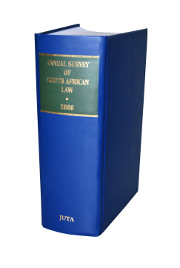Sentencing

Sentencing
Authors Andra le Roux-Kemp
ISBN: 978 1 48513 300 1
Affiliations: Assistant Professor at the School of Law, City University of Hong Kong; Visiting Research Scholar at the School of Law, University of the Witwatersrand
Source: Annual Survey of South African Law, 2015, p. 349 – 377
Abstract
None